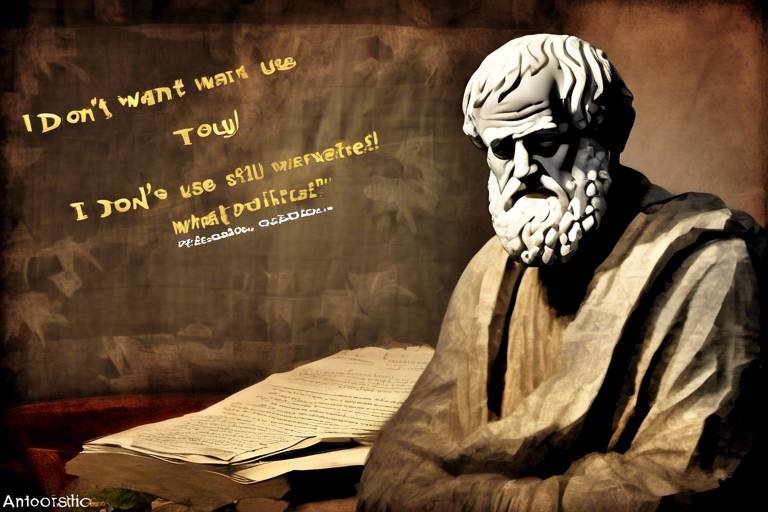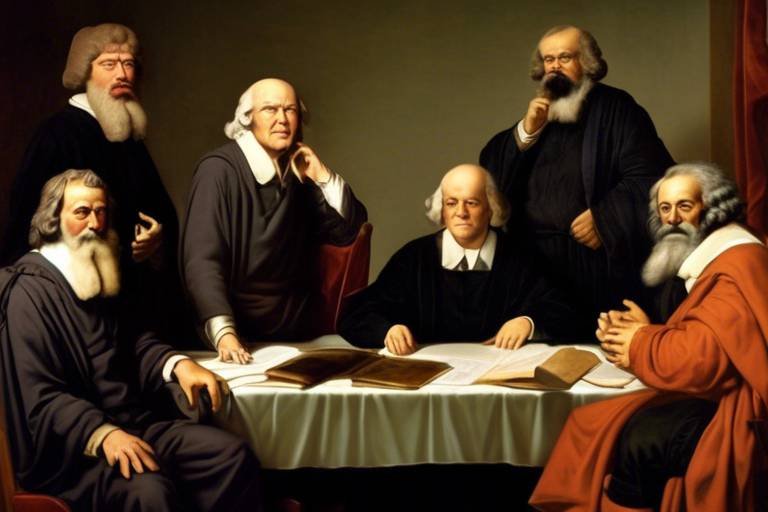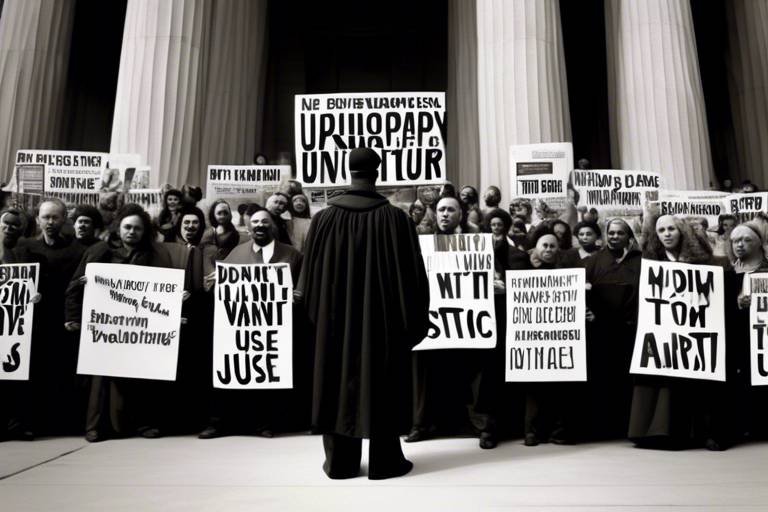How Platonism Influences Modern Political Structures
Platonism, rooted in the thoughts of the ancient philosopher Plato, continues to resonate in the corridors of modern political thought. Its principles, which emphasize the importance of justice, wisdom, and the common good, serve as a foundation for examining how contemporary governance operates. Just as a sculptor chisels away at a block of marble to reveal a statue, modern political structures are shaped by the enduring ideals presented by Plato. These ideals challenge us to think critically about our leaders, the systems we create, and the very essence of justice itself.
In our journey through the intricate tapestry of political philosophy, we will uncover how Platonism has not only influenced the theoretical frameworks of governance but also provided a lens through which we can evaluate the effectiveness and morality of our political systems. With its emphasis on the philosopher-king, the ideal state, and the pursuit of justice, Platonism invites us to reflect on the qualities we value in our leaders and the structures that support our societies. Are we, as citizens, holding our leaders accountable to these lofty ideals, or are we settling for mediocrity in our governance?
As we delve deeper into this exploration, we will also address the critiques that Platonism faces in the context of modern pluralistic societies. The tension between individual rights and collective responsibility, as well as the risks of elitism and authoritarianism, are crucial discussions that emerge when we apply Platonic principles to contemporary politics. Through this lens, we will not only appreciate the historical significance of Platonism but also engage with its relevance in our ongoing quest for a just and equitable society.
Ultimately, this article aims to provide a comprehensive understanding of how Platonism continues to shape our political landscape today. By examining its core concepts and their implications for modern governance, we can better appreciate the philosophical roots of our political systems and the ongoing dialogue between ancient wisdom and contemporary challenges.
Understanding Platonism's core concepts is essential to grasp its influence on modern politics, including its views on justice, the ideal state, and the role of philosopher-kings in governance. At its heart, Platonism is about the pursuit of truth and the belief that reality transcends the physical world. For Plato, the ultimate reality is a realm of ideal forms, and it is through the understanding of these forms that individuals can achieve true knowledge. This philosophical foundation leads to a vision of governance that prioritizes wisdom and virtue over mere power and influence.
- What is Platonism? Platonism is a philosophy based on the ideas of Plato, emphasizing the existence of ideal forms and the pursuit of truth, justice, and the common good.
- How does Platonism influence modern politics? Platonism influences modern politics by providing a framework for evaluating governance, emphasizing the importance of wise leadership, justice, and civic virtue.
- What are philosopher-kings? Philosopher-kings are rulers who possess deep knowledge and wisdom, ideally suited to govern in a just society according to Platonic principles.
- What critiques exist regarding Platonism? Critiques of Platonism include concerns about elitism, the potential for authoritarianism, and its applicability in diverse, pluralistic societies.

The Essence of Platonism
Understanding Platonism is like opening a treasure chest filled with profound insights that have shaped not only philosophy but also the very foundations of modern political thought. At its core, Platonism emphasizes the existence of abstract ideals and forms, suggesting that the material world is merely a shadow of a higher reality. This philosophical framework invites us to ponder deep questions about justice, the ideal state, and the role of leaders in society.
One of the most compelling aspects of Platonism is its exploration of justice. For Plato, justice is not just a legalistic concept; it is about achieving harmony within the state. Imagine a well-tuned orchestra where each musician plays their part perfectly, creating a beautiful symphony. In a similar way, Plato believed that a just society requires each individual to fulfill their role, contributing to the overall harmony and well-being of the community.
Another cornerstone of Platonism is the idea of the ideal state. Plato envisioned a society governed by wise and knowledgeable leaders, often referred to as philosopher-kings. These rulers would possess a profound understanding of the common good and the principles of justice, allowing them to make decisions that benefit all citizens rather than just a privileged few. This concept raises important questions about the qualifications and qualities necessary for effective governance in today's world.
Furthermore, Platonism encourages us to consider the nature of knowledge and its role in leadership. Plato argued that true knowledge is essential for making informed decisions, and this idea remains relevant today. In an era where misinformation can spread like wildfire, the ability to discern truth from falsehood is more crucial than ever. Leaders who embody wisdom and virtue can inspire trust and foster a sense of community, leading to more effective governance.
However, the application of Platonism in modern politics is not without challenges. The ideal of philosopher-kings can sometimes feel distant, especially in democratic societies where leadership is often determined by popularity rather than wisdom. This leads us to explore how contemporary thinkers reinterpret Plato's concepts, adapting them to fit the complexities of today's political landscape. The balance between idealism and practicality is a tightrope that many political theorists walk.
In summary, the essence of Platonism lies in its profound insights into justice, governance, and the qualities of effective leaders. By understanding these principles, we can better evaluate our political systems and strive for a society that reflects the ideals of wisdom, justice, and the common good.

Plato's Ideal State
Plato's vision of an ideal state is not just a theoretical construct; it's a profound framework that continues to resonate through the corridors of modern political thought. Imagine a society where wisdom reigns supreme, where the leaders are not merely politicians but enlightened individuals who prioritize the common good over personal gain. This is the essence of Plato's ideal state, which he vividly illustrates in his work, "The Republic." In this utopia, the state is structured in a way that promotes justice, harmony, and the well-being of all its citizens.
At the heart of Plato's ideal state lies the concept of justice. For Plato, justice is not merely a legalistic notion but a fundamental principle that ensures each individual plays their rightful role within society. He famously compares the state to a human being, suggesting that just as a healthy person has a well-functioning body with each part performing its role, a just society functions optimally when each class—rulers, warriors, and producers—contributes to the common good. This idea prompts us to ask: how relevant is this model in our complex, modern societies?
In Plato's framework, the rulers are the philosopher-kings, individuals who possess a deep understanding of the forms of justice and virtue. These rulers are not driven by personal ambition but are motivated by a genuine desire to serve their community. This leads to a crucial question: can we find leaders today who embody such altruism and wisdom? As we navigate through the political landscape, the need for wise governance becomes increasingly apparent. The philosopher-king model challenges us to rethink our expectations of leaders and the qualities we value in them.
Furthermore, Plato emphasizes the importance of education in achieving his ideal state. He believed that only through rigorous education could individuals ascend to the level of philosopher-kings. This educational journey is not just about acquiring knowledge; it’s about cultivating virtues that enable leaders to make decisions for the greater good. In contemporary terms, this raises a significant point: should political candidates undergo a form of philosophical training to prepare them for the complexities of governance? As we reflect on this, we can see how Plato's ideals still provoke thought and discussion in our modern political arenas.
In summary, Plato's ideal state serves as a mirror reflecting our aspirations for a just society. It compels us to consider the qualities we seek in our leaders, the role of education in governance, and the very nature of justice itself. While the practical implementation of these ideals may seem daunting, they offer a guiding light, urging us to strive for a society where wisdom and virtue are at the forefront of political life.
- What is the main idea behind Plato's ideal state? Plato's ideal state emphasizes justice, wisdom, and the role of philosopher-kings in governance, advocating for a society where leaders prioritize the common good.
- How does Plato define justice in his ideal state? For Plato, justice is the harmony achieved when each class within the society fulfills its designated role, much like a well-functioning body.
- Can the concept of philosopher-kings be applied today? While the idea of philosopher-kings may seem outdated, it encourages us to seek leaders who possess wisdom and a genuine commitment to serving their communities.
- What role does education play in Plato's ideal state? Education is crucial in Plato's framework, as it prepares individuals to become philosopher-kings by cultivating the necessary virtues and understanding of justice.

Philosopher-Kings
The concept of is one of the most intriguing and provocative ideas that emerge from Plato's work, particularly in his seminal text, "The Republic." At its core, this notion suggests that the ideal rulers of a state should not merely be politicians or military leaders but rather individuals who possess a profound understanding of philosophy, justice, and the greater good. Imagine a world where leaders are not just elected based on popularity or charisma, but on their intellectual prowess and moral integrity. Wouldn’t that fundamentally transform our political landscape?
Plato argued that these philosopher-kings would be uniquely qualified to govern because they have ascended beyond the shadows of ignorance, gaining true knowledge of the forms, especially the form of the good. This knowledge equips them to make decisions that benefit the entire society rather than serve personal interests or the whims of the masses. In this regard, the philosopher-king is akin to a lighthouse guiding a ship through treacherous waters, illuminating the path toward a just and harmonious society.
However, the implementation of this ideal raises several questions. How do we identify who qualifies as a philosopher-king? Is it enough to have academic credentials, or should there be a deeper, more intrinsic quality that defines these leaders? Moreover, in our modern context, where democratic principles emphasize equality and representation, can we truly justify the concentration of power in the hands of a few enlightened individuals?
To better understand the implications of philosopher-kings in today's governance, consider the following key aspects:
- Wisdom and Knowledge: The philosopher-king must possess a deep understanding of justice, ethics, and the complexities of human nature.
- Decision-Making: Their decisions should be based on rational thought and a commitment to the common good rather than populism.
- Education and Training: A rigorous educational system is essential to cultivate future leaders who embody these philosophical ideals.
In essence, the philosopher-king represents an ideal that challenges us to rethink the qualifications we prioritize in our political leaders. While the concept may seem utopian, it serves as a reminder of the importance of wisdom and ethical governance in a world often driven by short-term gains and superficial popularity.
- What is a philosopher-king? A philosopher-king is a ruler who possesses both philosophical knowledge and a commitment to justice, ideally suited to govern for the common good.
- How does the philosopher-king relate to modern politics? The philosopher-king model raises questions about the qualifications of leaders today and the importance of wisdom in governance.
- Can philosopher-kings exist in a democratic society? While the concept may seem challenging to implement in a democracy, it encourages a focus on the moral responsibilities of leaders.

Wisdom in Leadership
When we talk about , we're diving into a treasure trove of qualities that can transform the way a society is governed. Plato believed that leaders should not only be knowledgeable but also possess a deep understanding of justice and the greater good. This idea is particularly relevant today, as we navigate through complex political landscapes where decisions can have profound impacts on our communities. But what does it really mean to lead with wisdom? Is it merely about having the right answers, or is it more about asking the right questions?
Imagine a world where leaders are not just figureheads but are genuinely engaged in the pursuit of knowledge. They would embody qualities like empathy, integrity, and critical thinking. These attributes are essential because they allow leaders to connect with their constituents on a human level, making decisions that resonate with the needs and aspirations of the people. In this context, wisdom becomes a guiding light, illuminating the path toward effective governance.
Moreover, wisdom in leadership serves as a counterbalance to the often chaotic nature of politics. It encourages leaders to think long-term rather than just reacting to immediate pressures. For instance, a wise leader might prioritize sustainable policies that benefit future generations over short-term gains that may appeal to the electorate today. This kind of foresight is crucial in addressing pressing issues such as climate change, economic inequality, and social justice.
To further illustrate the significance of wisdom in leadership, consider the following qualities that wise leaders should embody:
- Emotional Intelligence: The ability to understand and manage one's own emotions, as well as empathize with others.
- Visionary Thinking: The capacity to envision a better future and inspire others to work towards it.
- Sound Judgment: The skill to make informed decisions based on a thorough understanding of the issues at hand.
- Integrity: The commitment to act ethically and uphold moral principles, even when faced with challenges.
Incorporating these qualities into leadership can lead to a more engaged and informed electorate. When citizens see their leaders embodying wisdom, they are more likely to feel connected to the political process. This connection fosters a culture of participation and civic engagement, which is essential for a thriving democracy. As Plato might argue, a wise leader is not just a ruler but a servant of the people, dedicated to the common good.
However, the pursuit of wisdom in leadership is not without its challenges. In a world dominated by sound bites and quick fixes, the deep, reflective thinking that wisdom requires can often be sidelined. This raises an important question: How can we cultivate wisdom in our leaders? It starts with education, mentorship, and a commitment to lifelong learning. By encouraging future leaders to seek knowledge and embrace the complexities of governance, we pave the way for a more just and equitable society.
In conclusion, wisdom in leadership is not merely an ideal; it is a necessity for effective governance. As we continue to grapple with the challenges of our time, let us remember that the qualities of a wise leader can make all the difference. They are the ones who will guide us toward a brighter future, ensuring that the principles of justice and the common good remain at the forefront of our political discourse.
- What is the role of wisdom in leadership? Wisdom in leadership involves making informed, ethical decisions that prioritize the common good over personal or political gain.
- How can leaders cultivate wisdom? Leaders can cultivate wisdom through education, mentorship, and a commitment to understanding the complexities of their roles.
- Why is emotional intelligence important for leaders? Emotional intelligence enables leaders to connect with their constituents, fostering trust and engagement in the political process.

Modern Interpretations
As we navigate the complexities of today's political landscape, the ancient ideals of Plato continue to resonate, albeit in new and often unexpected ways. The concept of the philosopher-king, once seen as an ideal leader possessing both wisdom and virtue, has been reinterpreted by contemporary thinkers who grapple with its feasibility in a modern democratic context. In a world where political systems are often marked by polarization and rapid change, the challenge lies in integrating these Platonic ideals into a framework that values both knowledge and public accountability.
One of the most significant reinterpretations of the philosopher-king model is the idea that leadership should not only be about wisdom but also about being responsive to the needs and desires of the populace. Today, leaders are expected to balance expertise with empathy, ensuring that their decisions reflect the collective will while still being informed by a deep understanding of justice and the common good. This blend of qualities raises an intriguing question: Can leaders be both knowledgeable and relatable? The answer lies in the evolving expectations of political candidates, who must now demonstrate not only their intellectual capabilities but also their ability to engage with citizens on a personal level.
Moreover, the ideal of the philosopher-king prompts us to consider the role of education in shaping future leaders. In Plato's vision, the most qualified individuals to lead are those who have undergone rigorous philosophical training. Today, this notion has transformed into a broader call for educational reform that emphasizes critical thinking, ethical reasoning, and civic engagement. By fostering a generation of informed citizens who are equipped to question authority and participate actively in governance, we can begin to bridge the gap between the lofty ideals of Platonism and the practical realities of modern democracy.
However, the reinterpretation of these Platonic ideals is not without its challenges. The ideal of the philosopher-king can easily slip into elitism if not carefully managed. In a democratic society, the notion that only a select few possess the wisdom to govern can alienate the very citizens that such leaders are meant to serve. Therefore, contemporary interpretations must strive to democratize the philosopher-king concept, ensuring that the wisdom and knowledge required for leadership are accessible to all, rather than confined to an elite class.
In conclusion, as we reflect on the legacy of Platonism in today's political discourse, it becomes evident that while the philosopher-king model offers a compelling vision of leadership, its application must be adapted to fit the complexities of modern governance. By embracing a more inclusive approach that values both wisdom and public engagement, we can honor Plato's ideals while fostering a political culture that is responsive to the diverse needs of society.
- What is Platonism? Platonism is a philosophy based on the ideas of Plato, emphasizing the existence of abstract forms and the importance of justice and the ideal state.
- How does Platonism influence modern politics? Platonism influences modern politics by providing a framework for evaluating leadership, justice, and the role of the state in promoting the common good.
- What are philosopher-kings? Philosopher-kings are rulers who possess both wisdom and virtue, ideally suited to govern for the benefit of all citizens.
- Can the philosopher-king model work in a democracy? While it presents challenges, modern interpretations suggest that integrating wisdom into leadership can enhance democratic governance.
- What critiques exist against Platonism? Critics argue that Platonism can lead to elitism and authoritarianism, raising concerns about its applicability in diverse societies.

Justice and the Common Good
When delving into the intricate relationship between justice and the common good, we find ourselves navigating a philosophical landscape that has shaped societies for centuries. Plato, the ancient Greek philosopher, defined justice as a harmonious balance within the state, where each individual plays their part for the betterment of the whole. This idea resonates deeply in contemporary discussions about social justice and the role of government in promoting the welfare of all citizens. But what does it mean to achieve justice in a way that genuinely serves the common good?
In today's political climate, the concept of justice is often debated, leading to various interpretations and implementations. For instance, we might consider the following aspects:
- Equity: Ensuring that all individuals have fair access to resources and opportunities.
- Inclusivity: Recognizing and valuing the diverse needs of different community groups.
- Accountability: Holding leaders and institutions responsible for their actions and decisions.
These elements are crucial in creating a society where justice is not merely an abstract concept but a tangible reality. The government, as Plato envisioned, should act as a guardian of these ideals, fostering an environment where the common good is prioritized. However, translating this philosophical framework into practical governance can be challenging. For example, policies aimed at achieving social justice often require a delicate balance between individual rights and the needs of the community.
Moreover, the role of government extends beyond mere regulation; it involves actively promoting the common good through social programs, education, and public health initiatives. When governments prioritize justice, they not only enhance the quality of life for their citizens but also cultivate a sense of shared responsibility. This is where the philosophical underpinnings of justice become a guiding light for modern political systems, encouraging leaders to look beyond their immediate interests and consider the broader implications of their decisions.
In conclusion, the dialogue surrounding justice and the common good is not just an academic exercise; it is a vital component of effective governance. As we reflect on Plato's insights, we must ask ourselves: How can we ensure that our political systems embody these principles? How can we create a society where justice is not just a lofty ideal but a lived experience for all? The answers to these questions will shape the future of our democratic ideals and the health of our communities.
- What is the relationship between justice and the common good?
Justice is often seen as the foundation for achieving the common good, as it ensures that all individuals are treated fairly and equitably within society. - How can governments promote justice?
Governments can promote justice by implementing policies that prioritize equity, inclusivity, and accountability, ensuring that all citizens have access to resources and opportunities. - Why is civic engagement important for justice?
Civic engagement fosters a sense of community and responsibility, encouraging individuals to participate in the democratic process and advocate for justice and the common good.

Influence on Democratic Ideals
The influence of Platonism on democratic ideals is profound and multifaceted. At its core, Platonism challenges us to think critically about the balance between individual rights and collective responsibility. Plato envisioned a society where the well-being of the community was paramount, yet he also recognized the importance of individual freedoms. This duality continues to resonate in modern political discourse, where we often find ourselves grappling with the tension between personal liberties and the needs of the greater good. For instance, how do we ensure that the rights of the individual are protected while also fostering a sense of community and responsibility? This question remains a central theme in contemporary governance.
Moreover, Platonism emphasizes the idea of civic virtue, which is crucial for a thriving democracy. Plato believed that citizens should not only enjoy their rights but also actively participate in the political process. This notion of civic engagement is more relevant today than ever, as we witness the consequences of political apathy and disengagement. Engaged citizens are the backbone of a healthy democracy, and they embody the moral responsibility that Plato advocated for. By encouraging individuals to take part in governance, we can cultivate a society that values both individual expression and collective action.
To illustrate this point further, consider the following table that outlines the key aspects of Platonism's influence on modern democratic ideals:
| Platonism Concept | Modern Democratic Ideal |
|---|---|
| Common Good | Collective Responsibility |
| Philosopher-Kings | Informed Leadership |
| Civic Virtue | Active Participation |
| Justice as Harmony | Social Equity |
As we navigate the complexities of modern governance, the lessons from Platonism remind us of the importance of nurturing a political culture that values both rights and responsibilities. The challenge lies in finding a harmonious balance that respects individual freedoms while promoting the common good. This delicate interplay is crucial in addressing contemporary issues such as social justice, equity, and the role of government in ensuring the welfare of all citizens. In a world that often seems divided, the ideals of Platonism offer a framework for fostering unity through shared values and collective action.
Ultimately, Platonism's influence on democratic ideals invites us to reflect on our roles as citizens. Are we merely passive recipients of rights, or are we active participants in shaping our communities? By embracing the principles of civic virtue and collective responsibility, we can honor the legacy of Platonic thought and work towards a more just and equitable society.
- How does Platonism relate to modern democracy? Platonism emphasizes the importance of civic virtue and the common good, which are essential for a functioning democracy.
- What is the role of individual rights in a Platonist framework? While Platonism values individual rights, it also stresses the need for these rights to be balanced with collective responsibility.
- Can the concept of philosopher-kings be applied today? Modern interpretations suggest that informed and wise leadership is crucial, although the strict philosopher-king model may not be practical in contemporary democratic contexts.

Individual Rights vs. Collective Responsibility
The tension between individual rights and collective responsibility is a fundamental debate in modern political discourse, echoing the philosophical underpinnings of Platonism. At its core, this conflict raises a pivotal question: how do we balance personal freedoms with the needs of the community? Plato, in his ideal state, emphasized the importance of a harmonious society where the well-being of the collective takes precedence over individual desires. This notion is not merely a relic of ancient philosophy; it resonates deeply in contemporary discussions on governance and social justice.
In many democratic societies, the principle of individual rights is enshrined in law, granting citizens the freedom to express themselves, pursue their own interests, and live without undue interference. However, as we navigate complex societal challenges—such as public health crises, environmental sustainability, and economic inequality—the call for collective responsibility becomes increasingly urgent. For instance, during a pandemic, individual rights to movement and assembly may need to be curtailed to protect the greater good. This scenario illustrates the delicate balancing act that governments must perform, striving to safeguard both personal liberties and the welfare of the community.
Moreover, the modern political landscape often sees these two concepts in conflict. Citizens may advocate for their rights, sometimes at the expense of communal harmony. This can lead to a fragmented society where the pursuit of individual interests undermines collective goals. An effective governance model must navigate this tension, ensuring that while individual rights are respected, they do not come at the cost of societal well-being. The challenge lies in fostering a culture of civic responsibility, where individuals recognize their role in contributing to the common good.
To further explore this dynamic, consider the following points:
- Public Policy Implications: Policies must reflect a balance that respects individual freedoms while promoting social responsibility. For example, laws mandating vaccinations during health emergencies can be seen as an infringement on personal choice, yet they serve the collective interest of public health.
- Community Engagement: Encouraging active participation in community initiatives can help bridge the gap between individual rights and collective responsibility. When citizens feel invested in their communities, they are more likely to prioritize the common good.
- Education and Awareness: Raising awareness about the importance of collective responsibility can shift societal attitudes. Educational programs that emphasize the interconnectedness of individual actions and societal outcomes can foster a more cohesive community.
In conclusion, the discourse around individual rights versus collective responsibility is not just a philosophical debate; it is a practical concern that shapes our political realities. As we strive for a just society, it is essential to recognize that individual freedoms and collective well-being are not mutually exclusive. Rather, they can coexist harmoniously when approached with thoughtfulness and a commitment to the greater good.
- What is the main conflict between individual rights and collective responsibility?
The main conflict lies in the tension between personal freedoms and the needs of the community, often requiring a balance to ensure both are respected. - How can governments address this tension?
Governments can address this tension by creating policies that respect individual rights while promoting social responsibility, ensuring that the needs of the community are met without infringing on personal freedoms. - Why is civic responsibility important?
Civic responsibility is important because it fosters a sense of community and encourages individuals to contribute to the common good, creating a more harmonious society.

Civic Virtue and Participation
Civic virtue is more than just a buzzword; it’s the lifeblood of a healthy democracy! Imagine a garden where every citizen is a gardener, tending to their patch of land to ensure it flourishes. In this metaphor, civic virtue represents the commitment individuals have to their community, emphasizing the moral responsibility of each person to engage in the political process actively. Plato believed that a society thrives when its citizens are not only aware of their rights but also their duties. This duality is crucial because when citizens participate, they contribute to the common good, creating a robust and resilient society.
Participation in governance isn’t just about voting; it encompasses a wide range of activities that foster engagement and collaboration. From attending town hall meetings to volunteering for local organizations, the ways individuals can contribute are varied and impactful. Civic virtue encourages citizens to step beyond their personal interests and consider the welfare of the community as a whole. This selflessness is what can transform a mere collection of individuals into a cohesive society that works towards common goals.
Moreover, Plato’s vision of civic engagement is deeply rooted in the idea that informed citizens are empowered citizens. This means that education plays a pivotal role in cultivating civic virtue. When individuals are educated about their rights, responsibilities, and the workings of their government, they are more likely to participate meaningfully. It’s like giving someone the tools to build a house; without the right tools, they can’t create a stable structure. Thus, educational initiatives aimed at enhancing civic knowledge can effectively promote participation.
However, fostering civic virtue is not without its challenges. In today’s fast-paced world, many individuals feel overwhelmed by their daily lives, leading to apathy towards political engagement. To combat this, communities can create inclusive spaces that encourage dialogue and participation. Think of community forums or social media platforms that allow for discussions on local issues—these can be powerful tools in rekindling interest in civic duties. When people feel their voices are heard and valued, they are more likely to engage actively.
Ultimately, the relationship between civic virtue and participation is symbiotic. As citizens engage more, they develop a stronger sense of responsibility towards their community, leading to greater participation. This cycle creates a vibrant democratic environment where everyone has a stake in the outcome. In this way, civic virtue is not just a philosophical concept but a practical framework for enhancing democracy. After all, a democracy thrives not just on the right to vote but on the willingness to participate and contribute to the collective welfare of society.
- What is civic virtue? Civic virtue refers to the moral responsibility of citizens to engage in their community and participate in governance for the common good.
- Why is participation important in a democracy? Participation is crucial because it empowers citizens, fosters accountability, and ensures that diverse voices are heard in the decision-making process.
- How can individuals promote civic virtue? Individuals can promote civic virtue by educating themselves about political issues, voting, attending community meetings, and encouraging others to participate.
- What role does education play in civic engagement? Education equips citizens with the knowledge necessary to understand their rights and responsibilities, making them more likely to engage in civic activities.

Critiques of Platonism
While Platonism has undeniably shaped political thought throughout history, it is not without its critics. One of the primary critiques revolves around the **feasibility** of implementing Platonic ideals in contemporary society. Critics argue that the notion of philosopher-kings, who are supposed to govern with wisdom and justice, can lead to an **elitist** approach to governance. In a world that values **diversity** and **pluralism**, the idea of a select few possessing the exclusive knowledge required to rule can be quite problematic. This elitism raises significant concerns about the **inclusivity** of governance and whether it truly represents the will of the people.
Moreover, the philosopher-king model can inadvertently pave the way for **authoritarianism**. When power is concentrated in the hands of a few individuals deemed "wise," there is a risk that this power can be abused. Critics point to historical examples where leaders, claiming to embody the ideals of wisdom and justice, have instead become tyrants. Such scenarios provoke a critical question: Can a system that relies heavily on a singular vision of the good truly accommodate the **complexity** of human society?
Another significant critique of Platonism is its tendency to prioritize the **common good** over individual rights. While the pursuit of a just society is undeniably noble, it can lead to the suppression of personal freedoms in the name of a perceived greater good. This tension between **individual liberties** and the collective responsibility is a central debate in modern political discourse. For instance, policies that aim to promote social welfare may inadvertently infringe upon individual rights, leading to a backlash against government intervention.
In addition, the abstract nature of Platonic ideals can sometimes clash with the **pragmatic** realities of governance. The ideal state, as envisioned by Plato, may be unattainable or unrealistic in the face of contemporary challenges such as economic inequality, social injustice, and environmental crises. This raises the question of whether a philosophical model can effectively address the **real-world** complexities of modern governance.
To further illustrate these critiques, consider the following table that summarizes the main points of contention surrounding Platonism:
| Critique | Description |
|---|---|
| Elitism | Concerns about the concentration of power in a select few, undermining democratic principles. |
| Authoritarianism | Risks of tyranny when power is held by those claiming to be wise. |
| Individual Rights vs. Common Good | The potential suppression of personal freedoms in pursuit of the greater good. |
| Pragmatism | The challenge of applying abstract ideals to the complexities of modern governance. |
In conclusion, while Platonism offers a profound philosophical framework for understanding governance, its critiques highlight the **challenges** of applying such ideals in a diverse and complex world. The balance between wisdom in leadership and the need for **democratic** inclusivity remains a crucial discussion in contemporary political thought.
- What is Platonism? Platonism is a philosophical theory developed by Plato that emphasizes the existence of abstract forms and ideals, particularly regarding justice and governance.
- How does Platonism influence modern politics? Platonism influences modern politics by promoting the idea of wise leadership and the importance of justice and the common good in governance.
- What are the main critiques of Platonism? The main critiques include concerns about elitism, the risks of authoritarianism, the tension between individual rights and the common good, and the challenge of applying abstract ideals to real-world governance.

Elitism in Governance
The concept of elitism in governance often raises eyebrows and sparks heated debates. At its core, elitism suggests that a select group of individuals—often deemed more knowledgeable or capable—should hold power and influence over the masses. This idea can be traced back to Plato's vision of philosopher-kings, who he believed were best suited to lead due to their wisdom and understanding of justice. However, as we navigate the complexities of modern political landscapes, the implications of elitism become increasingly contentious.
One of the primary concerns surrounding elitism is its potential to create a disconnect between leaders and the general populace. When governance is concentrated in the hands of a few, it can lead to policies and decisions that reflect the interests of the elite rather than the needs of the wider community. This scenario can foster feelings of disenfranchisement among citizens, who may feel that their voices are not being heard. In a world where social media and instant communication have empowered individuals to express their opinions, the gap between the elite and the general public can become a breeding ground for unrest and dissatisfaction.
Moreover, the elitist model can inadvertently perpetuate inequality. When leadership is predominantly held by a specific demographic—whether defined by wealth, education, or social status—it can create an environment where policies favor the privileged. This can reinforce systemic barriers that marginalize certain groups, making it difficult for them to gain equal footing in society. For instance, consider the following table that illustrates the potential disparities in representation within an elitist governance model:
| Demographic | Percentage in Leadership | Percentage in General Population |
|---|---|---|
| Wealthy Individuals | 70% | 10% |
| Educated Elites (Postgraduate) | 60% | 15% |
| Minority Groups | 10% | 30% |
This table highlights the stark contrast between the demographics of those in power and the broader population, illustrating how elitism can skew governance in favor of a select few. Furthermore, the concentration of power among elites can lead to a lack of accountability. When decision-makers are not directly accountable to the people they govern, it can create an environment ripe for corruption and abuse of power. This is particularly concerning in democratic societies, where the expectation is that leaders serve the interests of their constituents.
Despite these critiques, some argue that a certain level of elitism may be necessary for effective governance. They contend that complex societal issues often require informed and educated leaders who can navigate intricate political landscapes. However, the challenge lies in creating a balance that allows for knowledgeable leadership while ensuring that the voices of all citizens are heard and valued. This balance is crucial for fostering a healthy democracy where civic engagement thrives.
Ultimately, the question remains: can we find a governance model that embraces wisdom and expertise without devolving into elitism? As we continue to explore the legacy of Platonism in contemporary politics, it is vital to engage in discussions that prioritize inclusivity and representation. Only then can we hope to create a political landscape that truly serves the common good.
- What is elitism in governance? Elitism in governance refers to the concentration of power in a small group of individuals who are considered more knowledgeable or capable than the general populace.
- How does elitism affect democracy? Elitism can create a disconnect between leaders and citizens, leading to policies that favor the elite and potentially disenfranchising the general population.
- Can elitism be beneficial in governance? Some argue that informed leadership is necessary for addressing complex societal issues, but it must be balanced with inclusivity and accountability.
- What are the risks of elitism? Risks include perpetuating inequality, fostering corruption, and creating a lack of accountability among leaders.

Authoritarian Risks
The allure of Platonism, with its emphasis on wisdom and the ideal state, can sometimes cast a shadow over the democratic ideals we cherish today. While the notion of philosopher-kings may sound appealing, it raises significant concerns about the potential for authoritarianism. When we look at political systems that lean heavily on a singular vision of governance, we must ask ourselves: are we sacrificing our freedoms for the sake of an ostensibly 'better' society? In essence, the risks of authoritarianism rooted in Platonic thought can manifest in several ways.
First, there’s the danger of concentration of power. When a select few are deemed the 'wise' leaders, the decision-making process can become insular. This creates a scenario where those in power may disregard the needs and voices of the broader populace. In a democratic society, we thrive on diversity of thought and representation. However, if we adopt a philosopher-king model without checks and balances, we risk establishing a government that prioritizes the ideals of a few over the rights of many.
Moreover, the elitist implications of Platonism can lead to a disconnect between leaders and citizens. If governance is seen as a privilege reserved for the 'most enlightened,' it can foster a culture where average citizens feel alienated from political processes. This disconnection can breed apathy, as people may believe their voices are irrelevant in the grand scheme of things. The irony here is palpable: in striving for a just society, we may inadvertently create an environment where justice is only accessible to a select few.
Additionally, the strict adherence to Platonism can result in a narrow definition of the common good. What one group considers beneficial may not resonate with another. This can lead to policies that are not only exclusionary but also oppressive. For example, if a ruling class decides that certain freedoms must be curtailed for the sake of societal harmony, we could witness a gradual erosion of civil liberties. History has shown us that the road to authoritarianism is often paved with noble intentions, making it crucial for us to remain vigilant.
In light of these risks, it becomes essential to foster a political culture that values pluralism and inclusivity. This means encouraging diverse voices in governance and ensuring that power is not concentrated in the hands of a few. By promoting systems that allow for checks and balances, we can mitigate the potential for authoritarianism, ensuring that the ideals of justice and the common good serve all citizens, not just an elite few.
In conclusion, while the philosophical underpinnings of Platonism offer valuable insights into governance, we must tread carefully. The balance between wisdom and democratic principles is delicate, and recognizing the potential for authoritarian risks is essential for safeguarding our freedoms. As we navigate the complexities of modern governance, let us remember that true wisdom lies not just in knowledge, but in the ability to listen, adapt, and include the voices of all within our society.
- What is Platonism? Platonism is a philosophical doctrine based on the ideas of Plato, emphasizing the existence of abstract forms and the importance of an ideal state governed by wise leaders.
- How does Platonism influence modern politics? Platonism influences modern politics by shaping concepts of justice, governance, and the role of leaders, often emphasizing the need for wisdom in leadership.
- What are the risks of authoritarianism in a Platonist framework? The risks include concentration of power, elitism, and a narrow definition of the common good, which can undermine democratic principles and civil liberties.
- Can Platonism coexist with democracy? Yes, but it requires careful consideration of how wisdom is defined and how power is distributed to ensure inclusivity and representation.
Frequently Asked Questions
- What is Platonism and how does it relate to modern political structures?
Platonism is a philosophical framework based on the ideas of Plato, centered on concepts like justice, the ideal state, and the role of philosopher-kings. Its principles continue to influence modern political thought by providing a lens through which we can evaluate governance, leadership, and the pursuit of the common good.
- What are philosopher-kings and why are they important?
Philosopher-kings are rulers who possess both wisdom and knowledge, ideally suited to govern because they understand justice and the greater good. Their importance lies in the belief that wise leadership can lead to a more just society, a concept that remains relevant in discussions about qualifications for modern political leaders.
- How does Platonism influence our understanding of justice today?
Plato's definition of justice as harmony within the state informs contemporary discussions on social justice and equity. It challenges us to consider the role of government in promoting the welfare of all citizens, pushing for policies that reflect the common good rather than individual interests.
- What is the tension between individual rights and collective responsibility in modern politics?
This tension stems from the balance needed between protecting individual liberties and ensuring the common good. Platonism encourages civic virtue, suggesting that engaged citizens should participate in governance, which can sometimes conflict with personal freedoms.
- Are there critiques of Platonism in today's political landscape?
Yes, critiques often focus on the elitist implications of the philosopher-king model and its potential to promote authoritarianism. Critics argue that concentrating power in the hands of a few can undermine democratic principles and inclusivity, raising important questions about governance in pluralistic societies.
- How can modern thinkers reinterpret Platonism?
Modern thinkers reinterpret Platonism by adapting its core concepts to fit democratic contexts. They explore how the ideals of wisdom and civic engagement can coexist with contemporary governance, addressing the challenges of implementing these philosophical principles in diverse political environments.



















